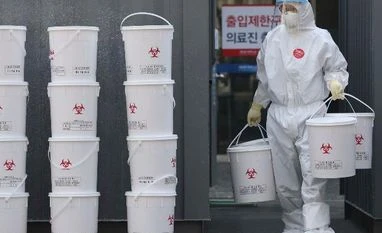Amid global coronavirus outbreak, researchers claim that half of the patients they treated for mild Covid-19 infection still had the nCoV for up to eight days after symptoms disappeared explaining why controlling the spread of the disease has been difficult.
The research, published in the American Journal of Respiratory and Critical Care Medicine, assessed 16 patients with Covid-19, who were treated and released from the Treatment Center of PLA General Hospital in Beijing between January 28 and February 9, 2020.
In the study, researchers, including Indian-origin scientist Lokesh Sharma from Yale University in the US, analysed samples collected of throat swabs taken from all the patients on alternate days.
They said the patients were discharged after their recovery and confirmation of negative viral status by at least two consecutive polymerase chain reaction (PCR) tests.
"The most significant finding from our study is that half of the patients kept shedding the virus even after resolution of their symptoms," said co-lead author Sharma. "More severe infections may have even longer shedding times," he said.
According to the research, the primary symptoms in these patients included fever, cough, pain in the pharynx, and difficult or labored breathing (dyspnea). They said the patients were treated with a range of medications.
The time from infection to onset of symptoms -- incubation period -- was five days among all but one patient, the scientists noted, adding that the average duration of symptoms was eight days. They said the length of time patients remained contagious after the end of their symptoms ranged from one to eight days.
ALSO READ: India coronavirus dispatch: Life lessons from the history of lockdowns
Two patients also had diabetes and one had tuberculosis, neither of which affected the timing of the course of COVID-19 infection, the study said.
"If you had mild respiratory symptoms from COVID-19 and were staying at home so as not to infect people, extend your quarantine for another two weeks after recovery to ensure that you don't infect other people," suggested study co-author Lixin Xie from the Chinese PLA General Hospital in Beijing.
"COVID-19 patients can be infectious even after their symptomatic recovery, so treat the asymptomatic/recently recovered patients as carefully as symptomatic patients," the scientists said.
The researchers said all of these patients had milder infections and recovered from the disease, and that the study looked at a small number of patients.
They noted that it is unclear whether similar results would hold true for more vulnerable patients such as the elderly, those with suppressed immune systems, and patients on immunosuppressive therapies.
"Further studies are needed to investigate if the real-time PCR-detected virus is capable of transmission in the later stages of COVID-19 infection," Xie added.
To read the full story, Subscribe Now at just Rs 249 a month
Already a subscriber? Log in
Subscribe To BS Premium
₹249
Renews automatically
₹1699₹1999
Opt for auto renewal and save Rs. 300 Renews automatically
₹1999
What you get on BS Premium?
-
Unlock 30+ premium stories daily hand-picked by our editors, across devices on browser and app.
-
Pick your 5 favourite companies, get a daily email with all news updates on them.
Full access to our intuitive epaper - clip, save, share articles from any device; newspaper archives from 2006.
Preferential invites to Business Standard events.
Curated newsletters on markets, personal finance, policy & politics, start-ups, technology, and more.
Need More Information - write to us at assist@bsmail.in
)